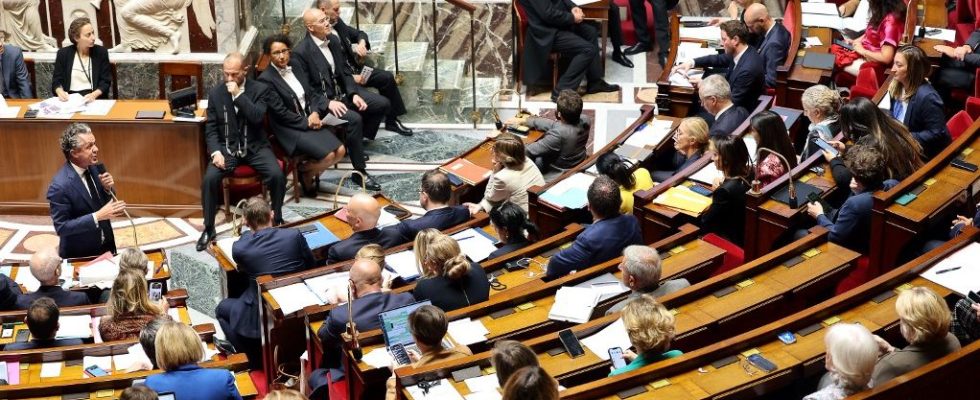It has been a political rite since 1974, and television since 1981: questions to the government of the National Assembly are today a masterpiece in danger. The session has the merit of being the only very visible and regular moment of the control activity of the executive power – the government – by the legislative power – the Parliament. But this theater, sometimes, of the first political stirrings of Wednesday afternoon on FR3, France 3 and now LCP, has lost its splendor. This is in any case the opinion of the President of the Assembly, Yaël Braun-Pivet (Renaissance), an opinion quite widely shared throughout the Hemicycle. She must bring together the heads of the different groups this Wednesday to discuss options for changing the format.
The format ? The government questions session takes place each session week on Tuesday, from 3 p.m. to 5 p.m. MPs therefore have two hours a week to question members of the government on current issues. Each group has a number of questions corresponding more or less to its representation in the Hemicycle. Each question and each answer cannot exceed two minutes. Only the Prime Minister has the right to exceed this time. But the two minutes are à la carte: you can ask a shorter question to keep a reply after the minister’s response. The minister has the right to do the same, always if he has not used up his initial two minutes.
A reform that only dates from 2019
This format dates from 2019 and a reform by the former president of the institution, Richard Ferrand. Before, no right of reply, but above all two one-hour sessions: one on Tuesday, one on Wednesday. It is above all this long two-hour session which is being singled out today. “It’s not a fantastic idea, these two hours in a row,” euphemizes the president of the environmental group, Cyrielle Châtelain. “A real tunnel doesn’t really have any meaning or interest,” judges MoDem Erwan Balanant, who notes that “from 4 p.m., there is no one there.” “In two hours you have 24 or 25 questions, and almost the assurance of having the same one two or three times as long as you try to be a little in the news,” notes for his part the president of the socialist group, Boris Vallaud.
20 minutes, who often spends his Tuesday afternoons in the press galleries at the Palais-Bourbon, makes the same observation: most of the time, the opposition groups place the questions, but also the most anticipated speakers, in start of the session. The atmosphere then often drops in the second hour, with questions that often concern more directly the constituency of the person at the microphone. And the Hemicycle becomes empty.
The proposals on the table
Among the deputies interviewed, apart from those who were rebellious, the right of reply is considered a good idea, to be retained. But we seem in favor of a return to the two one-hour sessions. “It would be interesting to meet again after the Council of Ministers [traditionnellement le mercredi], in reaction,” enthuses Erwan Balanant. This option is one of those put on the table by the President of the Assembly. Problem: the Senate took advantage of the desertion of deputies to hold its own question session at this strategic location.
Another idea: reduce the length of the questions. Or, more surprisingly, allocate speaking time to each group that they can manage as they wish. “We, over two hours, we have four minutes, it will quickly be seen, sweeps Cyrielle Châtelain. We risk having monologues, I don’t see where we can re-energize.” Erwan Balanant sees there “a gas factory”, which does not convince anyone among the elected officials interviewed.
Little arm suggestions
And the hypothesis of a pure and simple reduction, for example a single session of an hour and a half? It provokes an outcry from the rebellious side: “It’s like with public services: we degrade them to say that it doesn’t work and finally take some away,” quips an advisor. Or else, it’s the majority who are taking away their time, their questions are useless. » Because the majority’s questions are often “trampoline questions”, so that the government can calmly bounce back on them. To avoid this effect, several countries with this type of session have reduced the speaking time of the majority. But it’s hard to imagine the majority here shooting themselves in the foot like this.
In the end, Boris Vallaud judges that what is on the table remains small: “We are not going far enough in the reflection, I hope that Wednesday’s meeting is only the beginning. » He asked a socialist deputy to think about it. And overall, no one has a miracle solution. “In ideal questions to the government, the government would answer us,” quips Cyrielle Châtelain. Not wrong, even if the tendency to evade does not date from the Macronists’ takeover. Majority, government and opposition: everyone plays their role. This parliamentary “game” is not an evil in itself, the Hemicycle is almost made for this theatricality: the staging of disagreement. But it is increasingly difficult to find sincerity in it. And that cannot be decreed.

